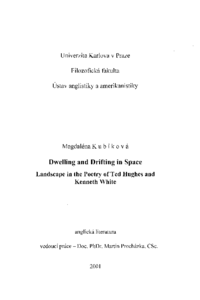Dwelling and drifting in space. Landscape in the poetry of Ted Hughes and Kenneth White
Bydenlí a přesouvání v prostoru. Krajina v poezii Teda Hughese a Kennetha Whitea
rigorózní práce (UZNÁNO)

Trvalý odkaz
http://hdl.handle.net/20.500.11956/5129Identifikátory
SIS: 27327
Katalog UK: 990016806430106986
Kolekce
- Kvalifikační práce [25007]
Autor
Vedoucí práce
Fakulta / součást
Filozofická fakulta
Obor
Anglistika - amerikanistika
Katedra / ústav / klinika
Ústav anglistiky a amerikanistiky
Datum obhajoby
28. 11. 2006
Nakladatel
Univerzita Karlova, Filozofická fakultaJazyk
Angličtina
Známka
Uznáno
Krajina patrila vzdy mezi zakladni temata poezle, pricemz basnicke pojeti tohoto svebytneho fenomenu se samozrejme menilo v zavislosti na historickem a kultumim prostredi a v prubehu staleti podlehalo zanrovym a esteticky-m konvencim. Predkladana prace se vsak pokousi 0 "mapovani" krajiny soucasne v dilech dvou britskych basniku, Teda Hughese a Kennetha Whitea. Zaroveii take sleduje urcite paralely mezi jejich ztvamenim krajiny a pojetim prostoru v soucasne filosofii, zejmena v knize Gilla Deleuze a Felixe Guattariho Tisic piosin. Soucasti uvodnich uvah 0 krajine v prvni kapitole je pak mj. i kratke zamysleni nad pojetim prirody a krajiny v cinske kulture a vychodni filosofii, k nimz se oba zmiiiovani basnici, byt' v ruzne mire, obraceli jako ke zdroji inspirace. Priroda, a tedy i krajina, ktera je "podobou a tvarem pfirody" (8-Tchao), neni v cinskem mysleni a poezii projevem Stvoritele, ale neCim, co existuje samo o sobe (cinsky- pojem zi-ran oznacujici pfirodu lze prelozit jako "svebytnost" ci "samo sebou"). Dalsi Cinsky vyraz pro prirodu, cau-chua, oznacuje "vznikani a promeiiovani" (Ci "tvoreni a zanikani" a reflektuje tak chapani pfirody jako neustale probihajiciho procesu, jehoz soucasti je i clovek. Toto vedomi sounalezitosti se projevuje i v pfistupu k umeleckemu ztvameni krajiny, jehoz predpokladem...
This study was originally motivated by a desire to bring together a personal predilection for both landscape(s) and the study of literature, to merge the affective and the cognitive with the more analytical. An attempt to write a critical study about landscape in poetry, however, is bound to encounter difficulties as it is bound to ask questions. As Chris Fitter suggests in his book Poetry, space, landscape, the subject offers multiple approaches and tends to spread innumerable strands linking often disparate areas. On the other hand, one may ask a subversive question, namely whether nature and landscape poetry is not somewhat anachronistic at the turn of the second millenium. It must have seemed so when Terry Gifford, in 1995, opened his book Green Voices3 with a polemical statement: "Nature poetry is having a bad time". He was referring to the previous decade during which allegedly the 'spirit of post-modernism' had changed the preoccupations of poetry and which was marked by such statements of reviewers and editors of poetry anthologies as: "We seem to have lost out nature poets", "We don't publish much landscape poetry" or "Ted Hughes is a remarkable writer but no longer the presiding spirit of British poetry". 4 The very title of Gifford' s book, however, indicates a new impetus behind contemporary...
